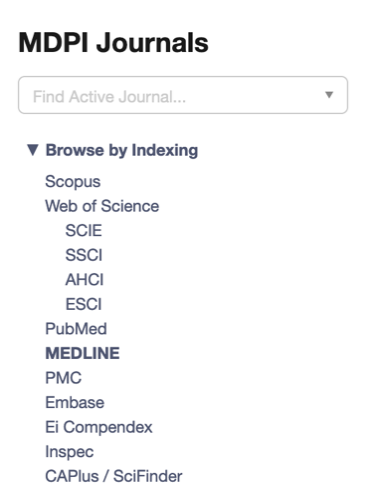
Journal Menu
► ▼ Journal Menu-
- Animals Home
- Aims & Scope
- Editorial Board
- Reviewer Board
- Topical Advisory Panel
- Instructions for Authors
- Special Issues
- Topics
- Sections & Collections
- Article Processing Charge
- Indexing & Archiving
- Editor’s Choice Articles
- Most Cited & Viewed
- Journal Statistics
- Journal History
- Journal Awards
- Society Collaborations
- Conferences
- Editorial Office
Journal Browser
► ▼ Journal BrowserNeed Help?
Announcements
19 August 2024
MDPI’s 2023 Young Investigator Awards—Winners Announced

MDPI’s Young Investigator Awards recognize promising early career scientists, acknowledge their contributions, and foster collaboration within the scientific community. We are proud to announce the recipients for 2023, who were carefully selected by the journals’ esteemed Award Evaluation Committee.
We extend our heartfelt congratulations to the 79 winners of MDPI’s 2023 Young Investigator Awards for their excellent contributions in their research field. We look forward to seeing these rising stars continue to contribute to the advancement of science.
MDPI will continue to support and recognize the academic community. To explore details about the awardees by field, please visit the individual pages listed below:
Congratulations to all the winners for their exceptional contributions and dedication to advancing scientific research.
About MDPI Awards:
To support the academic community, particularly young researchers, and to enhance communication among scientists, MDPI journals regularly offer various awards to researchers in specific fields. These awards, serving as a source of inspiration and recognition, help to elevate the profiles of talented individuals who have made outstanding achievements and are making significant contributions to advancements in their respective fields.
To find out more about MDPI awards, please click here.
7 August 2024
MDPI Insights: The CEO's Letter #14 - New Headquarters, Marketing, Poland

Welcome to the MDPI Insights: The CEO's Letter.
In these monthly letters, I will showcase two key aspects of our work at MDPI: our commitment to empowering researchers and our determination to facilitating open scientific exchange.
Opening Thoughts

MDPI Moves to New Headquarters in Basel, Switzerland

I am excited to share that MDPI has moved to a new state-of-the-art office space in Basel, Switzerland. This move consolidates our operations by bringing together our two previously separated Basel offices into one central location.
We are always growing our talent pool and encourage you to view our Careers Page for the positions available in Basel and across our offices.
New Address: Grosspeteranlage 5, CH-4052 Basel, Switzerland
Effective Date: 1 July 2024
This new chapter in our company’s journey is designed to continue our mission of positioning MDPI as a leader in Open Access (OA) publishing, highlighting our commitment to making scholarly research accessible to everyone.

Boasting modern amenities, improved meeting and event spaces designed to support our growing needs, the new location provides a more collaborative and efficient working environment for our employees. The location offers convenient accessibility to public transportation and is situated near the Basel SBB railway station, with a variety of nearby services and amenities.
In fact, I can see the trains right outside of my window as I write these lines!
This move marks an exciting milestone in MDPI’s development, and I am confident that the new headquarters will serve as an inspiring and productive space for everyone. We also very much look forward to welcoming visitors here. You can read more about MDPI's history here.
“This new chapter continues our mission of positioning MDPI as a leader in OA publishing”
For Those New to MDPI
A pioneer in scholarly, Open Access publishing, MDPI has supported academic communities since 1996. MDPI is leading the transition to Open Science by making a greater proportion of the research conducted worldwide free and accessible to everyone. To date, over 3.5 million researchers have entrusted MDPI with publishing their scientific discoveries. MDPI’s editorial process is bolstered by a network of dedicated reviewers, a team of 6,000 professional, well-trained staff members, and an in-house article submission platform designed to ensure efficient processes within its 440 fully Open Access titles. MDPI supports more than 800 academic institutions worldwide, helping them adhere to national mandates while facilitating authors’ publication in fully compliant (CC BY) Open Access journals.
Impactful Research
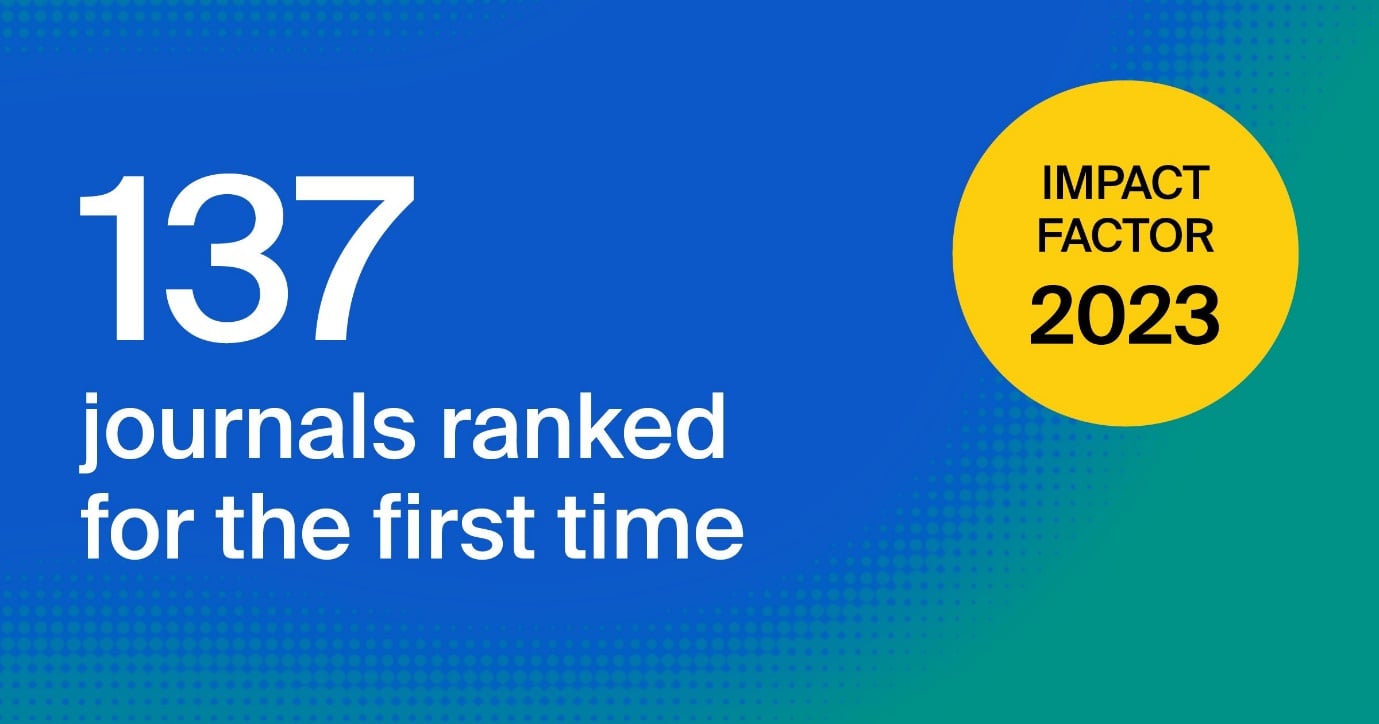
New and Emerging MDPI Journals Making an Immediate Impact
Unpacking some of the Impact Factor updates from the June CEO Letter, I wanted to dive a little deeper into the 137 MDPI journals which received Impact Factor for the first time.
Academic authors highly value efficient publishing processes, robust editorial support, and the opportunity to publish in high-impact journals. We are proud that our newly launched journals typically achieve coverage in the Emerging Sources Citation Index (ESCI) of the Web of Science within just a few years, with a median time of only three years from release to inclusion.
As part of our commitment to advancing academic research and providing high-quality OA publishing, we actively seek new research areas to expand our portfolio of journals. We have a proven track record of successfully establishing new journals.
Our dedicated teams excel in fostering dynamic editorial boards and working closely with Editors-in-Chief (EiC) to define the precise scope and focus of each new journal. Our expertise extends to collaborating with indexing services, ensuring that our journals comply with best practices and are indexed promptly in all relevant databases.
Emerging Titles Ranked for the First Time
Our commitment to excellence is reflected in the annual impact metrics released this past June. The latest edition of the Journal Citation Reports (JCR) showcases the integration of journals from the ESCI in the new unified category rankings, providing a simplified and more complete view of all journals within each subject category, including newly established titles.
Out of 137 new and developing MDPI journals ranked in the 2024 release, 79 are in the top half (Q1 or Q2) of their categories. Here is a breakdown of the number of MDPI’s ESCI-indexed journals by quartile in the JCR:
| Quartile | No. of journals |
| Q1 | 17 (12.4%) |
| Q2 | 62 (45.3%) |
| Q3 | 43 (31.4%) |
| Q4 | 15 (10.9%) |
| Not ranked (humanities-related journals) | 2 |
These rankings highlight our success in rapidly establishing high-impact new journals. Among those that made it directly into the top 25% of their category are the International Journal of Neonatal Screening, Journal of Xenobiotics, Polysaccharides, Smart Cities, and thirteen other journals.
You can browse MDPI journals by Indexing. Simply visit our Journals page and select from the list of Indexing bodies in the top left-hand corner.
Inside MDPI

MDPI Corporate Marketing Strategy and Team Meeting 2024
In July, I hosted the annual Corporate Marketing strategy and team-building activity with 15 of our team members.
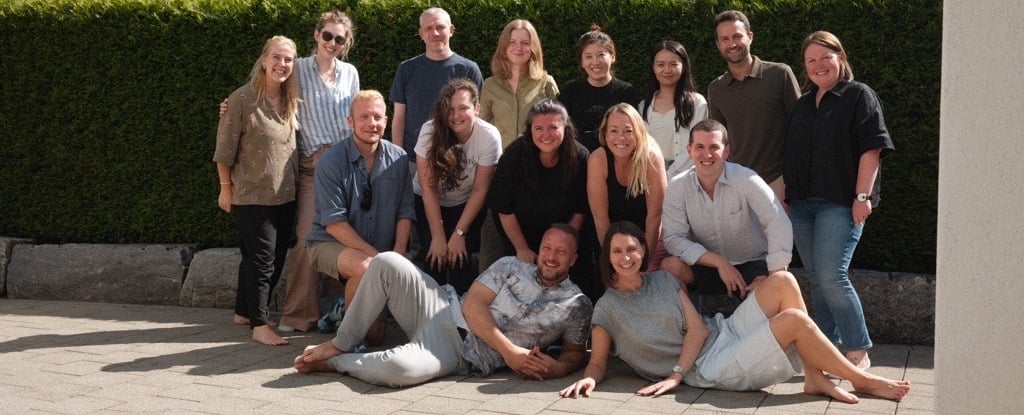
The aim was to align the Corporate Marketing strategy with MDPI's goal of becoming the world's most trusted OA publisher. While we provide a high-level publishing experience for our authors, as seen from our surveys, we need to keep building on our transparent and open communication to foster trust within the scholarly community and continue enhancing our reputation.
The Corporate Marketing team plays an important role as the mouthpiece for all our major activities within MDPI, especially those that model what it means to be a trusted partner. The purpose of the strategy meeting was to develop a feeling of trust in one another and an understanding of how to inspire trust in the stakeholders with whom we interact.
“We need to keep building on our transparent and open communication to foster trust within the scholarly community”

We conducted a set of activities to facilitate that sense of mutual trust and trustworthiness. Examples of some activities we worked on during this strategy-building event include:
- Exploring what trust means
- ‘Letter to self’
- ‘The brand I most trust’
- Most Trusted Academic Publisher
- ‘The brand I would like MDPI to become’
- ‘The 2029 MDPI Annual Report’
- Voice of Customer and Share of Voice – survey/data update on MDPI Brand Experience and Brand Perception
- Integrate Trust-Based Objective into Marketing Plan
- ‘Becoming the MDPI experience’
- ‘Trusting the next steps’
While two days is not enough to finalize a marketing strategy, it is sufficient to get everyone who attended into the mindset of the direction in which we are working. From here, we will develop a program with next steps on main projects, update communications, and collaborate with team leads to incorporate this approach into our work going forward.
As a marketing team, we can communicate our messages, but trust has to be built at every touchpoint in the stakeholder journey. Just talking about it isn’t enough. We need to be about it. That’s a role each of us plays, from editorial to IT, from marketing to HR. We must build trust from the inside out. It starts with each manager and resonates out via every team member.
As a company, our goal is to give all stakeholders with whom we interact – whether internal or external – the experience of working with an organization it can trust.
Coming Together for Science

MDPI in Poland: Krakow Office
In July, I had the pleasure of visiting our Krakow office, following my recent trip to Warsaw to meet with the Polish Ministry of Science and Higher Education.

During these visits, I prioritized meeting with our Office Manager, Editorial Director, Group Leads, and members from various teams, including editorial, production, marketing, and journal relationship specialists, to understand their roles and current challenges. Instead of a formal presentation, I opted for an open discussion, sharing updates from headquarters to engage with colleagues in a more personal way.
Our Krakow office has many things to be proud of, including a large number of PhD colleagues (over a third of its staff holds a PhD degree). Krakow provides an opportunity for expanding beyond the 100 colleagues we currently have, by adding new hires in departments including editorial, production and marketing, among others.
About our Krakow office
- Opened in 2020
- 99 staff members as at 1 August 2024
- Main Departments include Editorial, Production, English Department, JRS, PR
Our Krakow office participates in international conferences, conducts author trainings and scholar visits, and engages in local market outreach. The office is also a member of the Polish Chamber of Commerce for High Technology (IZTECH) and is working on expanding its local engagement.
Krakow is the second-largest city in Poland, with a population of about 800,000. It also has a large student population of around 128,000, with seven universities. This means that roughly one in every eight residents is a student.
Poland and MDPI

Poland is a crucial market for MDPI. From 2020 to June 2024, Poland ranked 7th in submissions and 5th in publications for MDPI research articles. As at 31 July 2024, Poland ranks 7th in total MDPI publications, with approximately 70,000 research papers.
Between 2020 and June 2024, 61,500 authors from Poland published with MDPI. As at 30 June 2024, there are 1,205 active Editorial Board Members (EBMs) from Poland, with 661 EBMs (55% of the total) having an H-index over 25.
We also have four Editors-in-Chief (EiC) from Poland leading our journals: Coatings, Venereology, Advances in Respiratory Medicine, and Limnological Review, along with six Section EiC.
In 2023, we received approximately 21,000 submissions from Polish-affiliated authors, of which 12,032 were published.
“Poland is a crucial market for MDPI”
Meeting with Ministry of Education

On 22 July, we visited Warsaw to meet with the Polish Ministry of Science and Higher Education.
We were pleased to learn that they are strong supporters of the OA publishing model and value MDPI’s approach to the peer-review process, including our high ethical standards for quality control.
In 2023 Polish authors predominantly published their papers in OA, with MDPI holding the largest market share in OA publications within the country.
Our commitment to collaborating with Polish institutions is evident through our 33 Institutional Open Access Program (IOAP) agreements with prestigious institutions such as the University of Warsaw, the University of Wroclaw, the Jagiellonian University, and Gdańsk University of Technology. Through IOAP discounts, a healthy waiver rate, and our peer-review voucher system, we provide the Polish scholarly community with significant savings in OA publishing. The Minister greatly appreciated these efforts and our commitment to offsetting some of the APC costs.
We discussed industry concerns about the threat of papermills and presented the preventive measures MDPI has in place to mitigate this risk and uphold high ethical standards. We informed them of our commitment to combating papermills, including our involvement with United2Act and the STM Research Integrity Hub, as well as our efforts to expand our research integrity team and explore proactive measures.
Closing Thoughts

MDPI Thought Leadership Op-ed on Open Access is Now Live on Politico
I am pleased to share that our thought leadership Op-ed piece on Open Access (OA) is now live on Politico. This is a nice push for continued influence and support of OA among policymakers and industry leaders.
Why Politico?
Politico's reputation as a highly credible and influential news platform makes it an important venue to reach key opinion leaders (KOL) from academia, policymakers, and thought leaders from many industries. This visibility helps promote the OA philosophy.
Open Access: A Moral Imperative for Progress
In this piece, I discuss the necessity of making scientific research freely available to all. I argue that publicly funded research should be publicly accessible, highlighting how OA democratizes scientific knowledge, accelerates research availability, and fosters collaboration.
“Open Access is a fundamental right for all citizens”
Democratizing scientific communication
The impulse to democratize scientific communication is nothing new. OA may seem like a recent innovation, but its principles have historical roots traceable to Europe in the 15th century. Just as the printing revolution accelerated the dissemination of new ideas, OA publishing unlocks new scientific insights that would otherwise only be accessible to a few.
Benefits for scholars: amplifying impact through Open Access
Authors publishing in an OA journal can expect more citations of their work, increasing its potential impact. Research findings that are freely available are more likely to be cited than those hidden behind a paywall. Freedom of access greatly increases the potential audience for each paper, fostering a sense of community among researchers worldwide. Heightened visibility can attract prospective collaborators and employers for young scientists. At MDPI, we believe that all these factors can only accelerate the advance of science. Additionally, authors retain copyright in their work instead of signing it away, permitting broader dissemination under Creative Commons licenses and increasing its capacity for impact.
The moral imperative
OA is not just a matter of scientific policy; it is a fundamental right for all citizens and a prerequisite for a brighter, more informed future. Publicly funded research should be a top priority, and I am pleased to see policy moving in this direction. Our capacity to generate transformative scientific insights has to be democratized. The question today is no longer whether we can afford to embrace OA; rather, it is whether we can afford not to.
Chief Executive Officer
MDPI AG
6 August 2024
Join Us at “MDPI Open Access—An Author Training Program”, 2 October 2024, the Agri-Food Research and Technology Centre of Aragon (CITA), Zaragoza, Spain

Three MDPI journals – Animals (ISSN: 2076-2615), Agronomy (ISSN: 2073-4395), and Foods (ISSN: 2304-8158) – are collaborating with the Agri-Food Research and Technology Centre of Aragon (CITA) to hold an author training session. This session will provide authors with a comprehensive understanding of MDPI's publishing process, current Special Issues in these journals, and opportunities tailored for different author groups. Academic editors will run the session, ensuring that participants gain the knowledge needed to maximize their publishing potential.
Date: 2 October 2024
Time: 11:30–13:00
Venue: The Agri-Food Research and Technology Centre of Aragon
Registration link: https://www.surveymonkey.com/r/6QB2H9L
Schedule:
|
Time |
Program and Content |
Speaker |
|
11:00–11:45 |
Introduction to MDPI, Animals journal and Editorial Process |
Ms. Paula Navarro |
|
11:45–12:15 |
How to Reply to Reviewers and Scientific Writing |
Mr. Iñigo Aristizábal |
|
12:15–13:00 |
Discussion after Presentation |
|
MDPI speakers:
|
Speaker |
Biography |
|
|
Ms. Paula Navarro is a biotechnologist with more than 6 years of experience in the scientific publishing industry. She joined MDPI in January 2018 and, after holding several roles (Assistant Editor, Section Managing Editor, Group Leader), she currently works as a Journal Relations Specialist for five journals: Genes, Antibodies, Dietetics, Epigenomes, and JMAHP. In recent years, she has organized and attended numerous online and in-person meetings with scholars. She has also attended several international conferences as MDPI’s representative. |
|
|
Mr. Iñigo Aristizabal is a biochemist with strong expertise in the academic publishing industry. He joined MDPI’s Barcelona office as an Assistant Editor in November 2017 and has worked as a Section Managing Editor and a Journal Relations Specialist, primarily for Genes, Cardiogenetics, DNA, and J—Multidisciplinary Scientific Journal, helping these journals with scholarly meetings and booth attendance at both virtual and in-person conferences. |
2 August 2024
MDPI Romania Author Training Sessions in May
In May, MDPI Romania held three author training sessions – one endorsing an external event and two stand-alone sessions.
The National Session of Scientific Student Communications took place at Technical University Cluj on 17 and 18 May 2024. MDPI Romania sponsored this event and contributed an author training session on the production of research papers and case study analyses. JRS Norbert Kiss gave a presentation called The World of Open Access to explain different open access publishing models and the benefits of open access publishing. His presentation highlighted the impact of open access publishing on scientific progress and innovation.
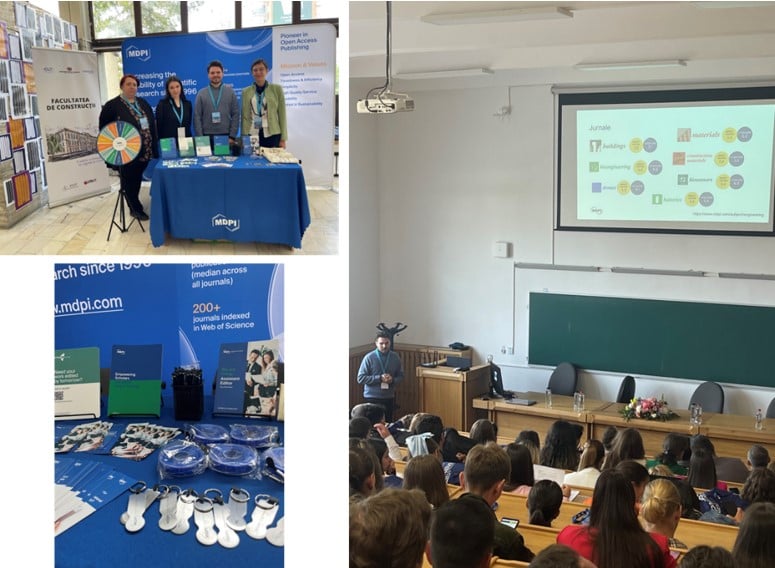
On 29 May 2024, MDPI Romania hosted an author training session for Ph.D. students, early career researchers, and professors at the Carol Davila University of Medicine and Pharmacy. In collaboration with Prof. Andreea Arsene, JRS Ioana Paunescu prepared two presentations: The Steps of the Publishing Process and Elaboration of a Peer Review Report. In her first presentation, she delved into MDPI’s history and mission, MDPI’s editorial process, and MDPI journals of various scopes that are accepting submissions. Her second presentation outlined the types of peer review, the contents of a peer review report by an MDPI reviewer, and the responsibilities of an MDPI reviewer.
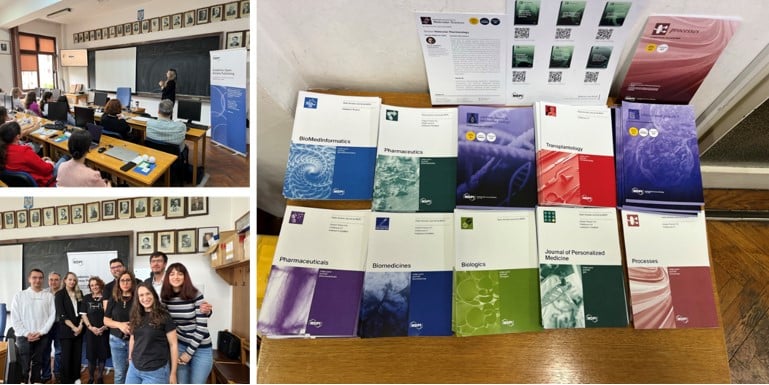
MDPI Romania also hosted an author training session at the Iasi University of Life Sciences on 29 May 2024. JRSs Laurentiu Preda and Cosmin Artan gave four presentations: Efficient Writing of an ISI-Indexed Scientific Article, Benefits of Publishing in the Open Access Model, Various Methods of Open Access Publishing, and MDPI Guide for the Article Review Process. The first three presentations offered guidance on how to improve academic writing, the fourth focused on how to write peer review reports. A highly interactive discussion followed the presentations, during which the JRSs provided extensive answers to attendees’ questions.
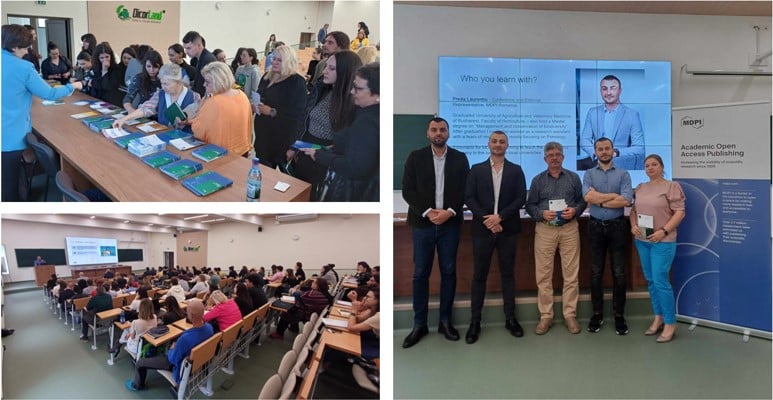
MDPI is grateful for all the attendees, speakers, and organizers involved in these events. Through their enthusiasm and dedication, these events were great successes.
26 July 2024
Animals Exceptional Reviewers List 2024

We are thrilled to share the updated Exceptional Reviewers List 2024. This program was designed to recognize and honor scholars who have consistently delivered exceptional review reports to our journal. Committed to fostering rigorous research and promoting knowledge exchange, the journal Animals (ISSN: 2076-2615) recognizes the significant role our reviewers play in maintaining the quality and integrity of the articles we publish. According to surveys conducted in 2023, 91% of our authors rate the peer review as good or excellent thanks to our pool of excellent reviewers.
We would like to express our sincere appreciation to all reviewers who have generously volunteered their time and expertise to assist in the peer-review process of Animals. Their dedication and attention to detail in evaluating manuscripts, offering valuable feedback, and contributing to academic rigor are truly commendable.
The Exceptional Reviewers List was introduced in April 2024. Each quarter, we will be selecting a group of outstanding reviewers and introduce them here.
Q1:
Name: Dr. Sławomir Mitrus
Affiliation: Institute of Biology, University of Opole, Opole, Poland
Interests: life history of animals; physiological ecology of animals; ecology and conservation of the European pond turtle (Emys orbicularis); ecology of ants
Name: Dr. Linda Van Bomme
Affiliation: 1 School of Natural Sciences, University of Tasmania, Hobart, Australia; 2 Fenner School of Environment and Society, Australian National University, Canberra, Australia
Interests: human wildlife conflict; wildlife management; predator ecology; conservation
Name: Dr. Richard D. Murray
Affiliation: Institute of Translational Medicine, University of Liverpool, Liverpool L69 3BX, United Kingdom
Interests: animal science; veterinary medicine; lameness in cattle; pathophysiology of pregnancy; digital dermatitis and dairy cattle
Name: Dr. Betty McGuire
Affiliation: Department of Ecology and Evolutionary Biology, Cornell University, Ithaca, NY 14850, USA
Interests: mammalian social behavior; parental care, and ecology; applied animal behavior; human–animal interactions; animal shelters; animal welfare
Name: Dr. Alejandro Casas-Alvarado
Affiliation: Neurophysiology, Behavior and Animal Welfare Assessment, DPAA, Universidad Autónoma Metropolitana (UAM), Mexico City 04960, Mexico
Interests: anesthesiology; pain assessment; pain management; animal behavior
Q2:
Name: Dr. Alejandro Plascencia
Affiliation: Faculty of Veterinary Medicine and Zootechnics, Autonomous University of Sinaloa, Culiacan 80260, Mexico
Interests: ruminal fermentation; ruminal metabolism
Name: Dr. Claudia Gittel
Affiliation: Rossdales Equine Hospital, Newmarket CB8 7NN, UK
Interests: veterinary medicine; equine science; regenerative medicine; ventilation; animal welfare; anesthesia; intensive care; pain management
Name: Dr. Marek Gaworski
Affiliation: Department of Production Management and Engineering, Warsaw University of Life Sciences, 02-787 Warsaw, Poland
Interests: animal behavior; dairy equipment; dairy technology; progress; welfare
Name: Dr. Luis M. Bautista Sopelana
Affiliation: Department of Evolutionary Ecology, National Museum of Natural History (MNCN - CSIC), 28006 Madrid, Spain
Interests: ethology; animal ecology; conservation biology; behavioral ecology; ornithology
Name: Prof. Dr. Aleksandro Schafer Da Silva
Affiliation: Department of Animal Science, Universidade do Estado de Santa Catarina (UDESC), Chapecó 89815-000, SC, Brazil
Interests: animal health; veterinary parasitology; biochemistry; clinical pathology; animal additives and supplementation
Q3:
Name: Prof. Dr. Ewa Joanna Godzińska
Affiliation: Laboratory of Ethology, Nencki Institute of Experimental Biology of the Polish Academy of Sciences, 02-093 Warsaw, Poland
Interests: ethology; neuroethology; altruism; aggression; entomology; myrmecology; ants; behavior of domestic animals (dogs and cats)
Name: Dr. Martin Maquivar
Affiliation: Department of Animal Sciences, Washington State University, Pullman, WA 99164, USA
Interests: applied reproductive management and physiology of beef and dairy cattle
Name: Prof. Dr. Han-Tsung Wang
Affiliation: Department of Animal Science and Technology, National Taiwan University, Taipei 10672, Taiwan
Interests: digestive tract microbes; rumen fermentation regulation; ruminant diet assessment; feed additives; protein and Enzyme; purification; biomaterials
Name: Dr. Sue Dyson
Affiliation: Independent Researcher, Suffolk, UK
Interests: improving the diagnosis of lameness and poor performance and maximizing the opportunity for horses to fulfill their athletic potential at whatever level
Name: Prof. Dr. Malcolm Jobling
Affiliation: Universitetet i Tromsø - Norges Arktiske Universitet, Tromso, Norway
Interests: fish feeding and nutrition; physiological energetics of cold-water ectotherms; physiological ecology; behavioral ecology - applications to aquaculture
Q4:
Name: Dr. Phillip Lancaster
Affiliation: Beef Cattle Institute, Kansas State University, Manhattan, KS 66506, USA
Interests: energy metabolism; feedlot nutrition; grazing management; liver abscess; production systems; sustainability
Name: Dr. Ralf Blank
Affiliation: Institute of Animal Nutrition and Physiology, Christian-Albrechts-Universität zu Kiel, 24118 Kiel, Germany
Interests: animal nutrition; feed additives; mycotoxins; ruminants; feed formulation; feed science; pigs; poultry; antinutritional factors
Name: Dr. Sylvia Masson
Affiliation: Clinique vétérinaire de la Tivollière, 38340 Voreppe, France
Interests: dogs and cats’ behavior and welfare
Name: Dr. Robin Foster
Affiliation: Department of Psychology, University of Puget Sound, WA 98416, USA
Interests: promote welfare of horses and dogs; improve human-animal interactions; dog and horse behavior and cognition
Name: Dr. Marcos Busanello
Affiliation: Department of Agricultural Sciences, High Uruguay and Missions Regional Integrated University, Frederico Westphalen 98400-000, Brazil
Interests: dairy cattle nutrition, feed composition, management, milk quality, and mastitis
18 July 2024
Meet Us at the 14th European Conference on Ecological Restoration (SERE2024), 26–30 August 2024, Tartu, Estonia

MDPI will be attending the 14th European Conference on Ecological Restoration (SERE2024) in Tartu, Estonia, which will take place from 26 to 30 August 2024. Ecological restoration is a topic that holds a prominent place on both political and scientific agendas. The decline in biodiversity demands our urgent attention, and degraded ecosystems around the world require an effective and knowledge-driven path to recovery. The SERE2024 will cover topics ranging from the theory and practice of restoring various ecosystems (wetlands, grasslands, forests, rivers, agroecosystems, urban and marine ecosystems) to the socioeconomic and political contexts of ecological restoration.
The following MDPI journals will be represented:
- Diversity;
- Land;
- Animals;
- Clean Technologies;
- Conservation;
- Ecologies;
- Environments;
- Forests;
- Geosciences.
If you are attending the conference, please visit our booth. Our delegates look forward to meeting you in person and answering any questions that you may have. For more information about the conference, please visit the following link: https://sere2024.org/.
12 July 2024
MDPI Webinar | World Hepatitis Day 2024, 29 July 2024

MDPI invites all experts recognized in their fields to attend the MDPI World Hepatitis Day Webinar 2024. Inspired by the collaborative spirit of World Hepatitis Day, this webinar aims to raise awareness about hepatitis and promote the development of innovative strategies to combat it. By engaging experts and the public, the webinar seeks to drive advancements and highlight the importance of collective efforts in scientific research and innovation.
We are looking forward to seeing you at the MDPI World Hepatitis Day Webinar 2024.
Title: MDPI World Hepatitis Day Webinar 2024
Date: 29 July 2024
Time: 15:00–17:00 (CEST) | 21:00–23:00 (CST Asia)
More Information: https://sciforum.net/event/WHD2024
This is a free webinar. After registration, you will receive a confirmation email containing information on how to join the webinar. Registrations with academic institutional email addresses will be prioritized.
Unable to attend? Register anyway and we will let you know when the recording is available for viewing.
Register for free:
Program:
|
Speaker/Presentation |
Time in CEST |
Time in CST Asia |
|
Host |
15:00–15:10 |
21:00–21:10 |
|
Assoc. Prof. Yee-Joo Tan |
15:10–15:40 |
21:10–21:40 |
|
Dr. Giuseppe Colucci |
15:40–16:10 |
21:40–22:10 |
|
Prof. Dr. Chia-Yen Dai |
16:10–16:40 |
22:10-22:40 |
|
Q&A Session |
16:40–16:50 |
22:40–22:50 |
|
Host |
16:50–17:00 |
22:50–23:00 |
Relevant Special Issues:
Animals
“Diseases of the Small and Large Intestine, Liver and Pancreas in Small Animals: Second Edition”
Edited by Dr. Alessio Pierini and Dr. Eleonora Gori
Deadline for submission: 20 December 2024
“Metabolic Disorders of Poultry”
Edited by Dr. Victoria Anthony Uyanga and Dr. Felix Kwame Amevor
Deadline for submission: 28 February 2025
Cancers
“Hepatitis Viruses and Cancer”
Edited by Prof. Dr. John Koskinas and Dr. Urania Georgopoulou
Deadline for submission: 1 November 2024
Cells
“Interdisciplinary Approaches to Studying Human Liver Biology and Promoting Organ Regeneration: Understanding the Curse of Prometheus”
Edited by Prof. Dr. David C. Hay, Dr. Matthew Sinton and Alvile Kasarinaite
Deadline for submission: N.A.
Children
“Old and New Therapeutic Strategies in Children with Liver Disease”
Edited by Dr. Raffaele Iorio and Dr. Fabiola Di Dato
Deadline for submission: 30 September 2024
Diagnostics
“Diagnosis, Management, and Prognosis of Liver Disease and Its Syndromes”
Edited by Prof. Dr. Chien Hao Huang
Deadline for submission: 31 August 2024
“Diagnostic and Prognostic Markers in Liver Diseases”
Edited by Dr. Dávid Tornai
Deadline for submission: 31 October 2024
“Diagnosis of Liver Disease”
Edited by Dr. Sung-Eun Kim
Deadline for submission: 31 December 2024
Gastroenterology Insights
“Novelties in Diagnostics and Therapeutics in Hepatology: 2nd Edition”
Edited by Dr. Giovanni Marasco and Dr. Matteo Renzulli
Deadline for submission: 31 December 2024
Journal of Personalized Medicine
“Chronic Liver Disease: New Targets and New Mechanisms”
Edited by Dr. Theodoros Androutsakos
Deadline for submission: 20 February 2025
Livers
“Liver Fibrosis: Mechanisms, Targets, Assessment and Treatment”
Edited by Prof. Dr. Ralf Weiskirchen and Prof. Dr. Tilman Sauerbruch
Deadline for submission: 20 December 2024
Medicina
“Editorial Board Members’ Collection Series: Gastrointestinal and Hepatic Diseases”
Edited by Prof. Dr. Ludovico Abenavoli and Dr. Marcello Candelli
Deadline for submission: 24 December 2024
“Advances in Liver Surgery”
Edited by Prof. Dr. Jai Young Cho
Deadline for submission: 24 December 2024
“Novelties in Chronic Liver Diseases”
Edited by Prof. Dr. Ludovico Abenavoli
Deadline for submission: 30 September 2024
Metabolites
“Research on Pharmacotherapy of Metabolic-Associated Fatty Liver Disease”
Edited by Dr. Aleksandra Bołdys
Deadline for submission: 30 September 2024
“Metabolic Syndrome and Non-alcoholic Liver Disease”
Edited by Prof. Dr. Mircea-Catalin Fortofoiu, and Dr. Luigi Boccuto
Deadline for submission: 20 October 2024
“Liver Injury and Regeneration—Metabolic Research”
Edited by Dr. Miguel Suárez Matías
Deadline for submission: 31 December 2024
Microorganisms
“Hepatitis B Virus Infection and Vaccine”
Edited by Dr. Nishi N. Prabdial-Sing
Deadline for submission: 15 December 2024
Nutrients
“Metabolic-Dysfunction-Associated Steatotic Liver Disease at the Forefront: Confronting Nutritional Obstacles in Advanced Chronic Liver Disease and Portal Hypertension”
Edited by Dr. Angelo Armandi and Dr. Federico Ravaioli
Deadline for submission: 15 October 2024
“Prevention and Treatment of Liver Diseases by Dietary Habits and Lifestyle”
Dr. Marica Cariello and Dr. Raffaella Maria Gadaleta
Deadline for submission: 15 December 2024
“Managing Nonalcoholic Fatty Liver Disease with Nutrition”
Edited by Dr. Nobuyuki Toshikuni
Deadline for submission: 25 December 2024
Pathogens
“Zoonotic Hepatitis E Virus: A Focus on Animals, Food and Environment”
Edited by Prof. Dr. Barbara Di Martino, Dr. Federica Di Profio and Dr. Andrea Palombieri
Deadline for submission: 10 October 2024
Vaccines
“Vaccines and Vaccination: HIV, Hepatitis Viruses, and HPV”
Edited by Dr. Ivan Schietroma and Dr. Sonia Moretti
Deadline for submission: 28 February 2025
“Vaccination and Treatments against Viral Hepatitis: Achievements, Challenges and Perspectives”
Edited by Dr. Bárbara Vieira Do Lago and Dr. Vinicius M. Mello
Deadline for submission: 15 March 2025
11 July 2024
Animals | Editor’s Choice Papers in the Section “Companion Animals”
Editor’s Choice Articles are selected based on suggestions from Animals’ Academic Editors worldwide. The journal’s Academic Editors select a small number of published articles that they consider will be of particular interest to our readers or important in their respective fields of research. We welcome you to read the Editor’s Choice Papers in the Section “Companion Animals”, a curated list of high-quality articles from 2022 to 2023 in this Section. The list of selected papers can be viewed below.
1. “Nutritional Composition and Untargeted Metabolomics Reveal the Potential of Tetradesmus obliquus, Chlorella vulgaris and Nannochloropsis oceanica as Valuable Nutrient Sources for Dogs”
by Ana R. J. Cabrita, Joana Guilherme-Fernandes, Inês M. Valente, Agostinho Almeida, Sofia A. C. Lima, António J. M. Fonseca and Margarida R. G. Maia
Animals 2022, 12(19), 2643; https://doi.org/10.3390/ani12192643
Available online: https://www.mdpi.com/2076-2615/12/19/2643
Editor’s Comments:
Food security is an increasing concern, and the environmental impact of pet food production is widely debated. The authors of the above study identified a novel, nutritionally balanced food suitable for dogs that can be made from microalgae.
2. “Babesia gibsoni Infection in Dogs—A European Perspective”
by Oliwier Teodorowski, Marcin Kalinowski, Dagmara Winiarczyk, Banu Dokuzeylül, Stanisław Winiarczyk and Łukasz Adaszek
Animals 2022, 12(6), 730; https://doi.org/10.3390/ani12060730
Available online: https://www.mdpi.com/2076-2615/12/6/730
Editor’s Comments:
The authors of the above review report confirmed cases of Babesia gibsoni infection in dogs in Europe. Most of these cases occurred in dog fighting breeds, especially American Pit Bull Terriers or related breeds, suggesting a breed-specific predisposition. Furthermore, rather than a tick bite, the main transmission route could be via wound contact with infected blood. The course of the disease is severe, and diagnosis and treatment are a challenge. The authors point out that B. gibsoni should be considered a possible emerging parasite in Europe.
3. “Expansion of Canine Heartworm in Spain”
by José Alberto Montoya-Alonso, Rodrigo Morchón, Sara Nieves García-Rodríguez, Yaiza Falcón-Cordón, Noelia Costa-Rodríguez, Jorge Isidoro Matos, Iván Rodríguez Escolar and Elena Carretón
Animals 2022, 12(10), 1268; https://doi.org/10.3390/ani12101268
Available online: https://www.mdpi.com/2076-2615/12/10/1268
Editor’s Comments:
Global warming favors the spread of vector-borne diseases, such as canine heartworm. The above study focuses on the epidemiology of heartworm in dogs and the impact of climate change in Spain. The study results show the expansion of canine heartworm in Spain, especially in northern regions where it has not been previously reported, such as the Basque Country. In some regions where the presence of Dirofilaria immitis has already been observed, its prevalence was not notable, probably because of the implementation of preventive measures in the dog population. The authors suggest that global warming, the mobility of animal reservoirs, and the modification of the landscape with high edaphic availability of water or stagnant water that provides suitable conditions for the presence of the culicid vectors have an impact on the expansion of D. immitis in Spain. The study results evidence the importance of the implementation of prophylactic programs in the canine population to control infection.
4. “Characterization of the Fecal and Mucosa-Associated Microbiota in Dogs with Chronic Inflammatory Enteropathy”
by David Díaz-Regañón, Mercedes García-Sancho, Alejandra Villaescusa, Ángel Sainz, Beatriz Agulla, Mariana Reyes-Prieto, Antonio Rodríguez-Bertos and Fernando Rodríguez-Franco
Animals 2023, 13(3), 326; https://doi.org/10.3390/ani13030326
Available online: https://www.mdpi.com/2076-2615/13/3/326
Editor’s Comments:
Disturbance of the intestinal microbiome (dysbiosis) is important in the pathogenesis of intestinal inflammation in dogs (and other species). However, most studies have only studied dysbiosis in fecal samples, which may not reflect what is happening in the small intestine where inflammation predominates. The authors of the above study compared the microbiota in the feces and duodenal biopsies of dogs with intestinal inflammation. The results showed dysbiosis in both areas compared with healthy controls. Furthermore, the results demonstrated greater changes in fecal samples compared to duodenal biopsies. These findings suggest that analysis of the fecal microbiota, which is much more accessible, can reflect dysbiosis within the small intestine.
5. “When and Why Cats Are Returned to Shelters”
by Vivian Mundschau and Malini Suchak
Animals 2023, 13(2), 243; https://doi.org/10.3390/ani13020243
Available online: https://www.mdpi.com/2076-2615/13/2/243
Editor’s Comments:
The authors of the above study report the return-to-shelter rate of adopted cats of just under 12% within 4 years of adoption with approximately half being returned within the first month. The risk of being returned was found to increase with the age of the cat at the time of adoption and if there was a history of biting and decrease if the cats had spent time in foster care. Short-term returns were mainly due to unacceptable cat behaviour, but the reason for cats being returned after more than 30 days was mainly due to the owner’s personal reasons. An increased in-depth understanding of these reasons and the timing of returns can increase the likelihood of developing strategies to keep cats in their new homes.
6. “Understanding the Factors Influencing Cat Containment: Identifying Opportunities for Behaviour Change”
by Gemma C. Ma and Lynette J. McLeod
Animals 2023, 13(10), 1630; https://doi.org/10.3390/ani13101630
Available online: https://www.mdpi.com/2076-2615/13/10/1630
Ma and McLeod’s interesting study into cat containment practices in New South Wales, Australia, adopted the Capability–Opportunity–Motivation (COM) Behavioural Model to determine the importance of these COM factors along with other situational factors in explaining the cat containment behaviours of cat owners. Owners not currently containing their pet cats can be divided into six profiles according to the COM themes, and this knowledge can be used to design specific strategies to encourage behaviour change and increase cat containment. The authors identified that encouraging a night curfew would be a useful first step towards 24-hour containment.
11 July 2024
Meet Us at the Aquaculture Europe 2024 (AQUA 2024), 26–30 August 2024, Copenhagen, Denmark

Conference: Aquaculture Europe 2024 (AQUA 2024)
Organization: European Aquaculture Society (EAS)
Date: 26–30 August 2024
Place: Ac Hotel by Marriott Bella Sky, Center Boulevard 5 2300, Copenhagen
MDPI journals will be attending AQUA 2024 as exhibitors. This meeting will be held in Copenhagen, Denmark, from 26 to 30 August 2024.
AQUA 2024 will take place in the Danish capital of Copenhagen. It will comprise a scientific conference, trade exhibition, industry forums, workshops, student events and receptions. The event will highlight the latest in aquaculture research and innovations, underpinning the continued growth of this exciting food production sector. It will be a showcase for Denmark and its innovation leadership in several key technologies that are crucial for future aquaculture, but the event will also function as a meeting and exchange platform for experts from around the world.
The following MDPI journals will be represented:
- Fishes;
- Animals;
- Antioxidants;
- Aquaculture Journal;
- Biology;
- Life;
- Diversity;
- Oceans;
- Sustainability;
- Water;
- JMSE.
If you will be attending this conference, please feel free to start a conversation with us. Our delegates look forward to meeting you in person and answering any questions you may have. For more information about the conference, please visit the following website: https://www.aquaeas.org/.
11 July 2024
Meet Us at the 49th World Small Animal Veterinary Association Congress (WSAVA 2024), 3–5 September 2024, Suzhou, China

It is our great pleasure to announce that MDPI will be attending the 49th World Small Animal Veterinary Association Congress (WSAVA 2024). This event will take place from 3 to 5 September 2024 in Suzhou, China, at the Suzhou International Expo Centre (SuzhouExpo).
The WSAVA World Congress is a unique opportunity for the profession to learn, share ideas, and build relationships with colleagues from all over the world. The 2024 WSAVA World Congress will emerge as a significant event, fostering extensive interaction amongst small animal veterinary professionals across the East and the West.
The following MDPI journals will be represented:
If you are considering attending this conference, we encourage you to visit our booth and speak to our representatives. We are eager to meet you in person and assist you with any queries you may have.
For more information about the conference, please visit the official website at http://www.2024wsava.com/.




